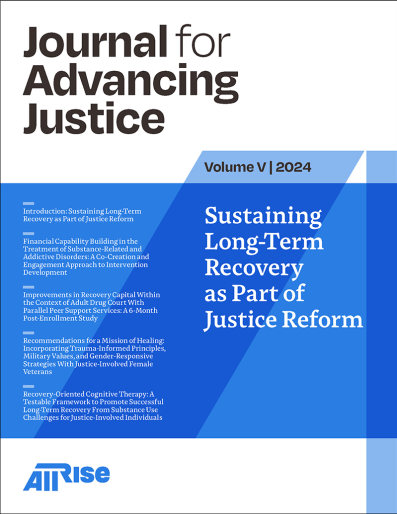Journal for Advancing Justice
The Journal for Advancing Justice is a peer-reviewed scholarly journal for practical use. It provides justice and public health professionals, policymakers, academics, scholars, and researchers a forum to share evidence-based and promising practices on pressing issues facing the justice system today. The journal is supported by a grant from the White House Office of National Drug Control Policy. Note: Publication of an article in the Journal for Advancing Justice does not imply All Rise’s endorsement of any specific intervention, assessment, or other practice.
Editor in Chief
Douglas B. Marlowe, J.D., Ph.D.
Associate Editor
John R. Gallagher, Ph.D.
Associate Editor
Carolyn Hardin, M.P.A.
Managing Editor
Brooke Glisson

About Our Next Volume
The Journal for Advancing Justice is now reviewing submissions for Volume VI, “Implementation Research in the Justice System: Strengthening the Real-World Delivery of Effective Substance Use and Mental Health Recovery Practices.” This volume will report on evaluations of real-world efforts to enhance practice implementation in justice programs serving persons with serious and persistent substance use, mental health, and/or trauma disorders and other severe treatment or social service needs, such as unstable housing, traumatic brain injury, or low recovery capital.
The submission deadline has passed. Click below to learn more about how to submit to future volumes.
About Volume VI
“Implementation Research in the Justice System: Strengthening the Real-World Delivery of Effective Substance Use and Mental Health Recovery Practices”
Decades of research in treatment courts and other justice programs have identified dozens of best practices shown to protect public safety, improve treatment and justice system outcomes, and conserve scarce public resources. However, many practices identified as effective in controlled studies or specific settings are not implemented widely or reliably in routine operations. Implementation research examines how services are delivered in real-world settings, identifies service barriers and approaches for overcoming those barriers, and evaluates the degree to which the services achieve reliably safe and effective results across a range of programs and contexts.
The Journal for Advancing Justice is reviewing manuscripts for Volume VI reporting on evaluations of real-world efforts to enhance practice implementation in justice programs serving persons with serious and persistent substance use, mental health, and/or trauma disorders and other severe treatment or social service needs, such as unstable housing, traumatic brain injury, or low recovery capital.
The deadline to submit your work for consideration has passed.
To submit your work for consideration in future journal volumes:
- Download and review the full call for submissions to learn more about content parameters and priority topics.
- Complete the submission form below to submit an abstract or a full manuscript. To submit a manuscript, prepare all documents and complete/sign all forms indicated as required in the manuscript guidelines and submission form.